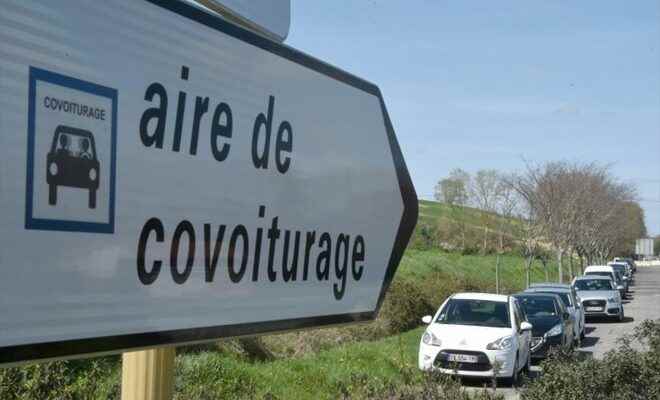A bonus of 100 euros will be paid to motorists who start carpooling in 2023 (AFP / Archives / PASCAL PAVANI)
The government announced on Tuesday a boost of 100 euros for motorists who will start carpooling in 2023, on both short and long journeys.
This bonus will be paid only to new registrants on carpooling platforms.
For daily trips (less than 80 kilometres), 25 euros will be paid from the first trip and an additional 75 euros if 9 trips are made in the following three months.
Longer distances, which represent a very large majority of journeys, are also encouraged: another bonus of 100 euros, which can be combined, will be paid to new registrants who have completed three journeys.
After a first plan initiated by Elisabeth Borne in 2019 and difficult Covid years for carpooling, the government wants to give a new boost to this organized hitchhiking.
France is at the forefront in this area and the government finds its account there: carpooling fights the end of the world (traffic jams and pollution) like the end of the month, offering a small compensation when the liter of gasoline reaches or even exceeds two euros.
– “Snowball” –
While Blablacar has exploded the long-distance carpooling market, it is above all a question of emphasizing home-to-work carpooling. If the practice took off with the strikes and the surges in fuel prices, it still only represents 900,000 trips per month.
This daily carpooling works well in Rouen or Montpellier: these cities subsidize carpooling platforms, creating more or less regular lines for much less than a bus line.
The bonus makes it possible to “maintain this snowball”, welcomed Olivier Binet, president of the Karos platform, while “the most difficult thing is to make your first carpool”. 90% of drivers who make the jump chain 80 carpools over the first 12 months, according to its platform.
“This is the plan we dreamed of”, launched the co-founder of Blablacar, Nicolas Brusson, during the presentation of the new boost in Reims.
In Witry-les-Reims, a few kilometers from the capital of champagne, the Ecov platform inaugurated a carpooling system on Tuesday without an appointment in the morning from 7:00 a.m. to 9:00 a.m.
In the “kingdom of solo driving” that is Greater Reims, according to its president Catherine Vautrin (ex-LR), passengers report via an application and a luminous panel lights up on the side of the road for Reims. Motorists who stop receive 0.50 euro per passenger.
– “Ecological gain” –
“In this territory as in many others in France, we need the car”, underlined the Minister Delegate for Transport, Clément Beaune. “The target is not the car itself but the individual and polluting car”.

A sign indicates a carpooling area, near Toulouse, on April 5, 2018 (AFP/Archives/PASCAL PAVANI)
As part of the plan, the government plans to support communities that offer financial incentives, up to 50 million euros for 2023. It also intends to push employers or organizers of sporting events to coordinate more shared journeys.
The idea is to convince motorists beyond modest backgrounds. “There is a real financial interest but it also represents a significant ecological and social gain: we meet people, friends, colleagues”, explains Mr. Binet.
50 million euros in bonuses will also be paid directly to users via carpooling platforms.
Finally, an equivalent sum will be devoted to the co-financing of carpooling areas or dedicated lanes, up to one euro paid for each euro invested by the local authorities.
The goal is to go from 900,000 trips to three million in a few years.
Tripling the number of carpoolers would avoid the emission of 4.5 million tonnes of CO2 per year, according to the Ministry of Transport.
This 2023 plan will be analyzed and updated in the following years, underlined the Minister of Ecological Transition Christophe Béchu.
For Pierre Leflaive, of the Climate Action Network, it “is going in the right direction” but should be accompanied by a “drastic increase in investment in public transport and cycling infrastructure”.
© 2022 AFP
Did you like this article ? Share it with your friends with the buttons below.




